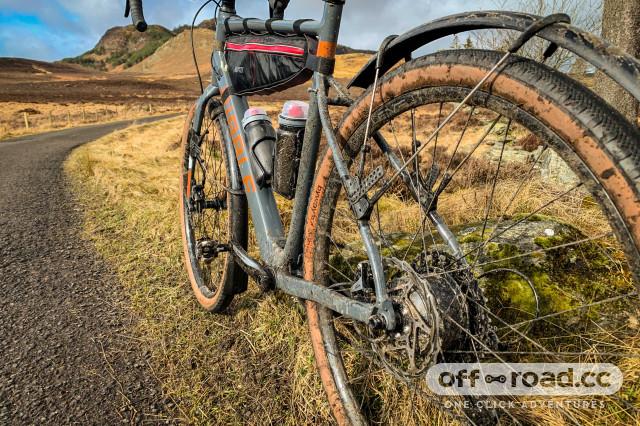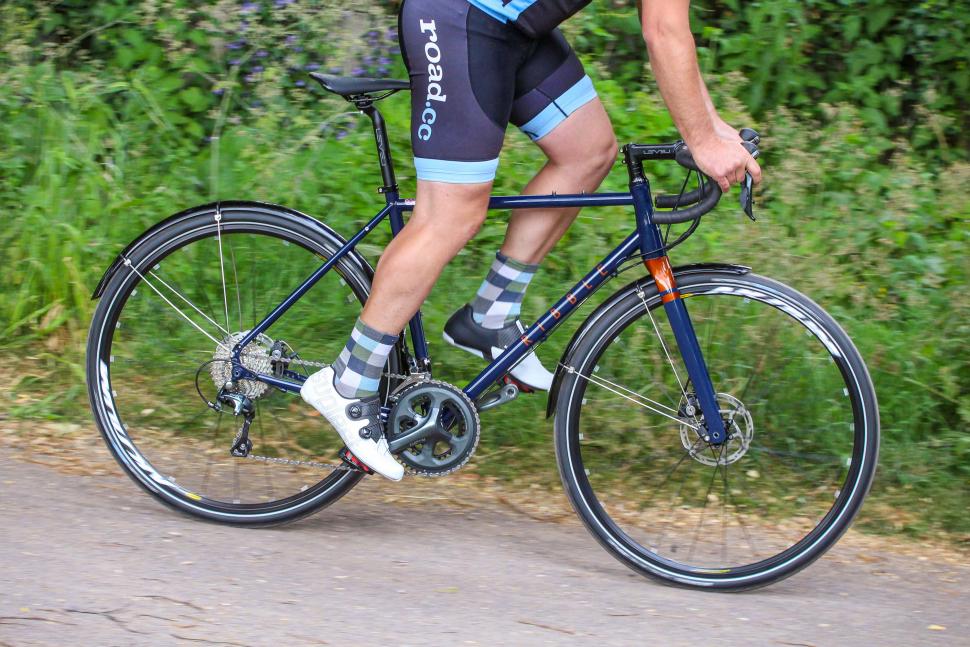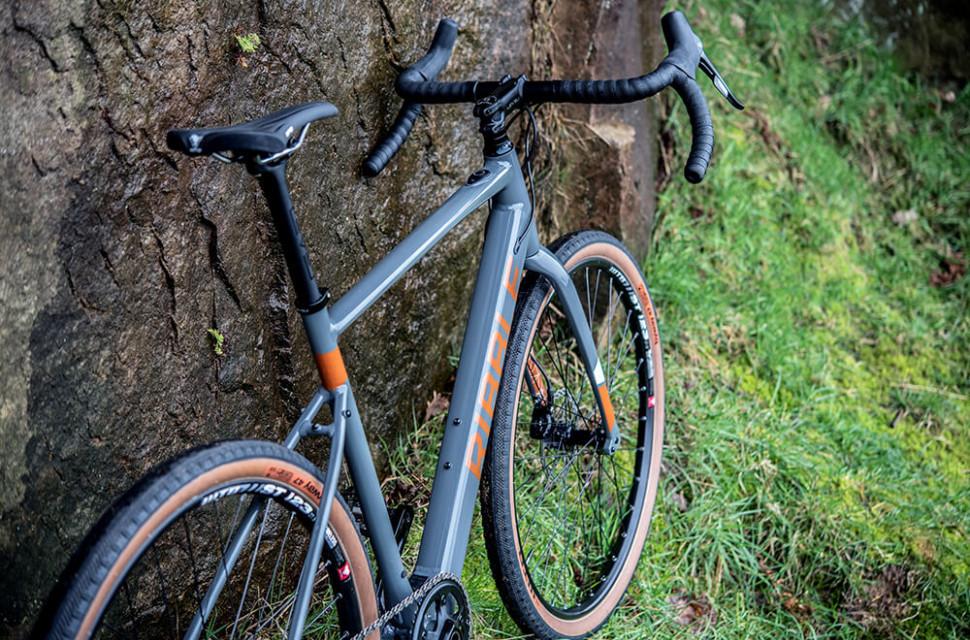- News
- Reviews
- Bikes
- Accessories
- Accessories - misc
- Computer mounts
- Bags
- Bar ends
- Bike bags & cases
- Bottle cages
- Bottles
- Cameras
- Car racks
- Child seats
- Computers
- Glasses
- GPS units
- Helmets
- Lights - front
- Lights - rear
- Lights - sets
- Locks
- Mirrors
- Mudguards
- Racks
- Pumps & CO2 inflators
- Puncture kits
- Reflectives
- Smart watches
- Stands and racks
- Trailers
- Clothing
- Components
- Bar tape & grips
- Bottom brackets
- Brake & gear cables
- Brake & STI levers
- Brake pads & spares
- Brakes
- Cassettes & freewheels
- Chains
- Chainsets & chainrings
- Derailleurs - front
- Derailleurs - rear
- Forks
- Gear levers & shifters
- Groupsets
- Handlebars & extensions
- Headsets
- Hubs
- Inner tubes
- Pedals
- Quick releases & skewers
- Saddles
- Seatposts
- Stems
- Wheels
- Tyres
- Health, fitness and nutrition
- Tools and workshop
- Miscellaneous
- Buyers Guides
- Features
- Forum
- Recommends
- Podcast
Bikes of the Year video: Ribble CGR 725 & AL e

This article includes paid promotion on behalf of Ribble
The CGR 725 has won gravel bike of the year and placed third in the overall bike of the year. If that wasn’t enough, the CGR Al e also landed in the top ten for the gravel category.
The CGR is a bike that really can do a bit of everything and it does it very well. We love it because it’ll offer so much to a rider that is looking to get a bike that can tackle a number of different riding types. After all, very few people have the money to have a separate bike for each discipline and we all know that one of the best things about bikes is going wherever takes your fancy.
> ebiketips electric bikes of the year 2020/21
Both the CGRs that we had on test impressed our reviewers first and foremost with their ride quality. The CGR 725 revolves around Reynolds steel tubing and a carbon fork which we think gives the CGR a smooth and fun ride regardless of you being on tarmac or lose surfaces.
The CGR Al e gets a more wallet-friendly aluminium frame again with a carbon fork. Again, we loved the ride quality that the CGR provided. And, of course, that’s helped by the motor. More on that in a bit.
> off.road.cc's Best Bikes of 2020/21 - Gravel Bike of the Year Award
The ‘Jack of all trades’ moniker, that is often seen as a negative as it means that the bike isn’t really that great at any one thing, is actually the CGR’s selling point. The fact that you can have one bike that will do so many different types of riding means that many riders will love it for the versatility that it allows the rider to put into their route selection. If you’re out on a leisurely road ride and spot a gravel road that you fancy exploring, you can just point the CGR at it and go. Fancy heading into the woods for the day? The CGR is perfectly capable of that too.
As we said in our review: “Unless you're lucky enough to have a wallet deep enough and garage large enough to house every subset of riding niche from pure road to pure gravel, having one bike that's equally happy taking care of the daily commute plus weekend gravel or road riding adventures is a strong plus.”
> We reveal the road.cc Bike of the Year 2020/21 + Video
The CGR’s frameset benefits from a geometry that allows you to take on these varied surfaces with confidence. What you’re getting is a blend of elements from the disciplines that give the CGR its name, ‘Cross, Gravel and Road. You’ll find a fairly tall head tube for good off-road position, low bottom bracket for 'cross stability and figures that split the difference with a road bike elsewhere.
The handling on the road is very neutral. At normal cruising speeds, the CGR is very well behaved. It'll take on all types of corner whether they are long, flowing and fast, or short and sharp, with little input from you, the rider – just point and shoot, really. There are no surprises – you can just keep spinning the gears and focus on where you're heading. It's a surprisingly easy and fun bike to ride.
> Review: Ribble CGR 725
So, one frameset family but two very different builds. Before we take a look at the spec of the two bikes that we tested, it is worth mentioning that alongside the stock builds that Ribble offers on the CGR range, you’re able to choose to fully customise your build using the Ribble BikeBuilder. It’s an excellent way to get the bike that is going to be perfect for your riding without needing to spend money to change parts after you’ve already bought your new bike. You can also add in things like mudguards that are made to fit the bike.
In terms of what we have here, the CGR 725 has 650b wheels, a 2x11 Shimano 105 groupset and quite frankly you’re looking at a bike that can be a road bike on Saturday, a gravel adventurer on Sunday and then a commuter through the week.
> Review: Ribble CGR AL e
There is space for nice wide tyres and we always love to see mounts for mudguards and a rack.
Our test build was a little on the weighty side by road standards at 12.25kg, but by swapping the wheels out something lighter you can easily a kilo off. Getting the weight down just a bit has a very noticeable difference in the responsiveness of the bike, however, weight is never the primary focus of a steel road bike and the excellent ride quality means that you won’t be too bothered by a little extra heft in the frame.
In fact, as we pointed out in our review, a bit of weight can be a very good thing, especially for commuters and when riding on broken winter roads. You get a planted feel with the CGR that gives the rider more confidence, enhancing the smooth ride that the steel frame was designed for in the first place.
The CGR Al e is built rather differently with a more gravel focus. This bike has Shimano’s 1X GRX groupset. It has super quick shifting and those hydraulic disc brakes are excellent. For the money, it is fabulous.
The Level finishing kit that we have here is simple alloy stuff but it is great. Should you want to upgrade, there are some carbon options too.
The 725 gets its name from the grade of steel tubing it is made from. So this is Reynold's 725, a heat-treated Chromoly steel that is triple-butted (differing wall thicknesses), giving a balance of stiffness and comfort.
The welding is neat and tidy, and the deep blue paintjob and copper detailing give it a plush look. If uniqueness is your thing, you can select Ribble's Custom Colour option and choose whichever paint and decal combinations you so desire.
One of the hardest things to get right with a steel frame is how to blend the skinny looking traditional tubes of the majority of the frame with modern additions like a tapered head tube and chunky carbon fork. The hourglass shape that Ribble has chosen for the head tube works well, we reckon, softening the way it blends with the top tube and the down tube. The fork legs tie in nicely, and running the brake cable through the fork gives a clean look too.
Ribble has even managed to get a bit of internal cabling going on with the frame – impressive with such narrow tubes, even if it's only the rear mech cable which runs from one end of the down tube to the other.
Other touches are the 12mm thru-axles front and rear - not always seen on steel frames - and flat mounts for the brake callipers. Keeping the traditional vibes going, you'll find a threaded bottom bracket sitting between the cranks and the frame.
Ribble has opted for Mahle's Ebikemotion X35 system for the AL e (as have the likes of Orbea, Colnago, Bianchi, Cannondale, Pinarello and Wilier). Weighing 3.5kg all-up, it's a well-respected setup with dealers easy to find for support. Providing the juice is a 250Wh Panasonic battery. The system gives you pedal-assist power with 40nM of torque.
In reality, this isn’t the most powerful of the motor options out there, but it does provide a generous helping hand for riders that want it, and it’s a really good choice for a bike like this
The main benefit of this system is that the bike doesn’t actually look like a big heavy eBike and it doesn’t ride like one either. Should you end up riding without the power assist, be that because you’re going faster than 15.5mph or you turn the power off, the bike simply rides like a normal gravel bike.






Interesting theory - how many points does it take for them to drive carefully?
At the end of the consultation in May 2025, a decision will be taken.........
The absurdity of it deepens when you realise that those points were acquired by the age of 26.
BAM!
"Polartec Power Shield RPM fabric – which has a 10,000mm hydro head to keep wet weather out, and an industry-leading breathability spec of 30,000g...
Oxfordshire councils are quite capable of letting you down too!...
'each spoke' (single) and 'leaf spring' (made of many leaves) seems contradictory.
I guess Morrissey could claim it.
I do see a lot of delivery riders (on illegal e-motorbikes) with their faces covered...
Stuff like this seems more relevant than ever after the Trump victory. sorry not a funny